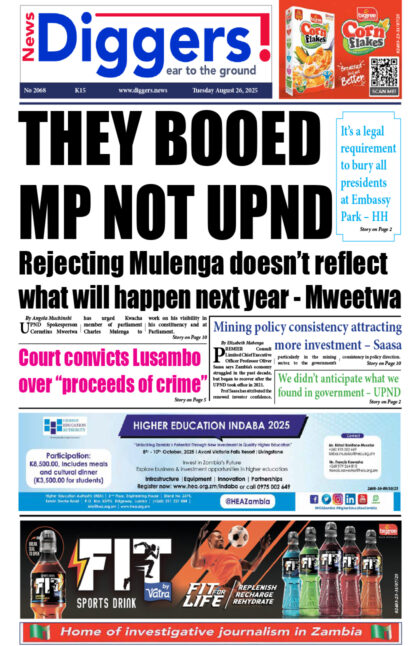THE Auditor General’s Report on the Accounts of Parastatal Bodies and other Statutory Institutions for the financial year ended 31st December 2019 has revealed that NAPSA procured 28 motor vehicles costing K23,912,000 on a personal-to-holder basis, contrary to guidelines.
And the report has revealed that the National Pension Scheme Authority (NAPSA) paid amounts totalling K2,381,249 in sitting allowances to members of staff who attended board meetings without authority.
Meanwhile, the report revealed that 43,878 members who made contributions to NAPSA in amounts totalling K548,174,090 had missing National Registration Cards (NRC) numbers.
The report revealed that despite government issuing a Circular to abolish the provision of personal-to-holder motor vehicles in 2016, the Authority introduced duty facilitating vehicle guidelines as a replacement of personal-to-holder motor vehicle policy in May 2019.
“On 16th December 2016, government issued Cabinet Office Circular No. 17 of 2016 which directed Boards of various State-Owned Enterprises and Statutory Bodies, to abolish the provision of personal-to-holder motor vehicles as a way of reducing the cost of running government business. According to the circular, the personal-to-holder motor vehicle facility was to be replaced by a loan scheme where employees were to procure motor vehicles at subsidized costs from Public Service Micro Finance Company. The loans were to be repaid through deductions effected on individual employee from payroll,” the report stated.
“According to the circular, all addressees were urged to ensure that the contents of the circular were brought to the attention of Board members. The following were observed: delay to present the circular to the board although the circular was received on 16th December 2016, management only brought it to the attention of the Board on 10th May 2018, despite the Board meeting 15 times during the period from January 2017 to May 2018. Failure to Implement the circular in pursuant to the implementation of circular, the Authority introduced duty facilitating vehicle guidelines as a replacement of personal-to holder motor vehicle (PTHMV) policy in May 2019. However, it was observed that the conditions under the duty facilitating vehicle guidelines relating to procurement, use and disposal were the same as those under the personal-To-Holder Motor Vehicle (PTHMV) Policy.“
The report stated that the authority had not implemented the provisions of the Circular as of February 2021.
“The clauses in the duty facilitating vehicle guidelines on purchasing of vehicles by employee (4.0) included the following: The employee will have the option to buy the vehicle after five years at 20 percent of the initial purchase cost; directors will however have the option to purchase the vehicle at the end of the contract period at 20 percent of initial cost or 25 percent of the market value whichever is higher; and on separation from the Authority before five years, the employee will have the option to purchase the vehicle by settling the outstanding net book value of the vehicle plus 20 percent of the initial cost of the vehicle at the time of separation from the Authority,” the report stated.
“A review of records revealed that the authority had procured 28 motor vehicles costing K23,912,000 for members of staff that renewed or joined the Authority after 10th May 2018 on either duty facilitating or personal-to-holder basis. In this regard, the Authority had not implemented the provisions of the Circular as of February 2021.”
The report revealed that out of 1,790,073 members on the NAPSA database, 22,884 members had shared national registration cards.
“A review of the NAPSA member standing data on the database revealed that as of December 2019, the Authority had 1,790,073 members. According to the Authority’s Know Your Customer (KYC) guidelines, each member on the database must have, among other information, a social security number, national identity number and names. An analysis of the database to establish conformity to the KYC and data integrity revealed the following,” the report read.
“A review of the members’ details on the master database (eNAPSA) revealed that 22,884 members shared national registration card (NRCs) numbers. Missing Essential Member Details. An analysis of the standing data from the member master database revealed that 43,878 members who made contributions in amounts totalling K548,174,090 had missing National Registration Cards (NRC) numbers. A review of non-compliant members list as of June 2020 revealed that the Authority was owed amounts totalling K16,089,421,579 by various institutions. Included in the outstanding amount of K16,089,421,579 is an amount of K98,486,621 in respect of 121 employers that had either ceased operations, moved from their known places of operations or defaulted on agreements with the Authority or orders from the courts.”
The report stated that the Authority had unreconciled amounts totalling K2,995,136.
“The eNAPSA was designed to address the reconciling items mainly arising from unidentified credits and challenges faced in receipting of member contributions. A review of financial and other records revealed that the Authority had unreconciled amounts totalling K2,995,136 which had not been allocated to any employer and employees account as at 31st December 2019,” the report stated.
“Employers who were not on the eNAPSA platform made their contributions under the Legacy System where they remitted the funds without submitting returns which included details on how the funds were distributed to the members. It was however observed that the NAPSA main Collection Account had 761 unallocated contributions in amounts totalling K43,807,761 for the period ranging from 2009 to 2018 as of February 2021.”
The report also revealed that NAPSA paid amounts totalling K2,381,249 in sitting allowances to members of staff who attended board meetings without authority.
“During the period under review, NAPSA paid amounts totalling K2,381,249 in respect of sitting allowance to members of staff who attended Board Meetings without authority. During the period under review the Authority paid amounts totalling K3,433,120 in respect of Cash in lieu of Christmas. However, the Authority did not have any regulation which backed the payment of Cash in lieu of Christmas, thereby rendering the payments irregular,” the report revealed.
The report stated that the Authority had recorded losses of rental income from Pick’n Pay Zambia in amounts totalling K5,049,828.
“During the financial year ended 31st December 2019, the Authority set to achieve gross revenue amounting to K1,141,894,087 from seven portfolio investments out which revenue in amounts totalling K821,288,966 was generated giving a negative variance of K320,605,121. Out of the 11 investment classes, only GRZ bonds, treasury bills and infrastructure investments had exceeded their annual benchmark return for 2019 which were set at 6.17 percent, 1.45 percent and 1.44 percent in that they had annual average returns of nine percent, two percent and two percent respectively. The rest of the investments classes recorded annual average returns that were below their set benchmarks,” stated the report.
“On 25th June 2012, Society House Development Company Limited acting on behalf of NAPSA signed an Agreement to Develop and Lease (ADL) with Pick n Pay Zambia Limited for the development and leasing of a supermarket within the shopping center at Society House. On 1st January 2017, Pick ‘n Pay Zambia Limited commenced trading as a supermarket outlet at Society House. However, it was observed that due to clause 8.5 and 8.6, the company did not pay rentals for a period of 24 months to NAPSA from January 2017 to December 2018, resulting in loss of rental income in amounts totalling K5,049,828. In this regard, it was not clear why NAPSA signed such an adverse contract at the expense of pensioners’ funds, without a recourse for recovery.”
























